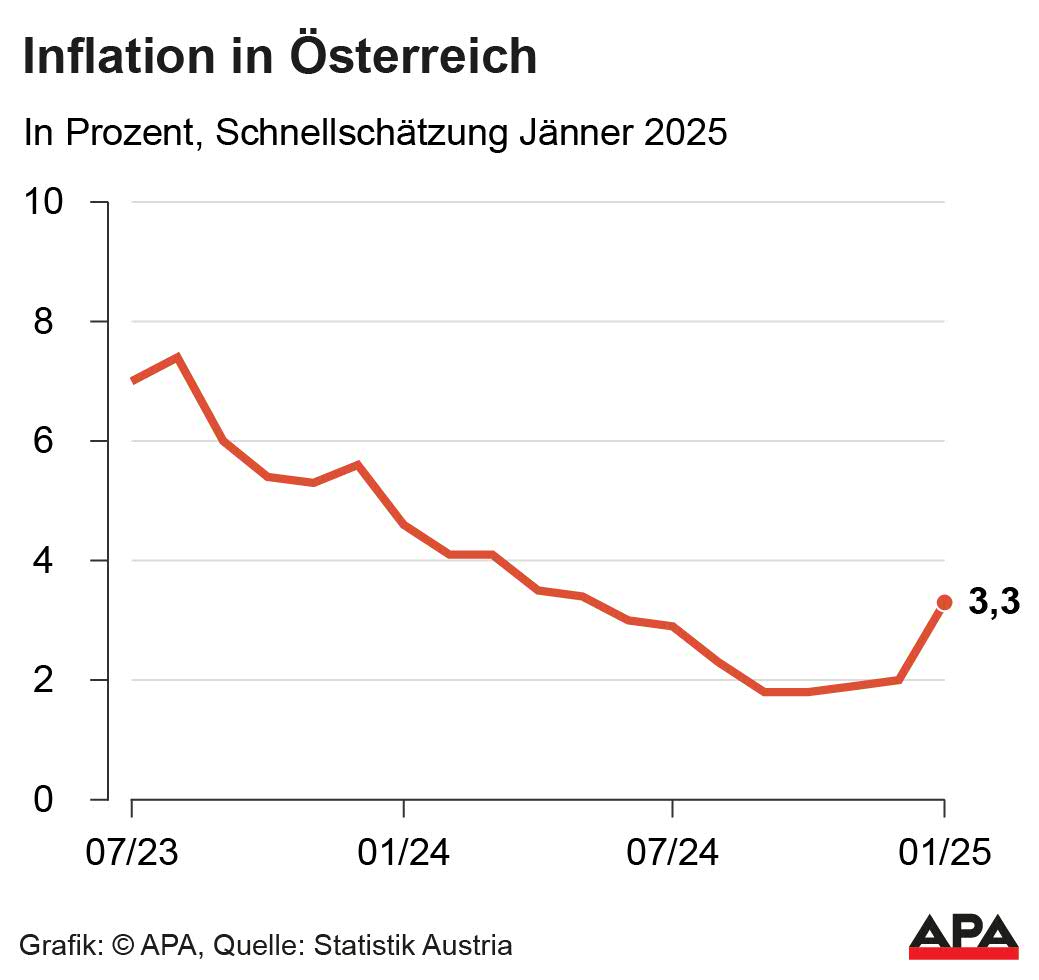Inflation Rose to 3.3 Percent in January
The increase in electricity prices in particular caused reactions: "If there are not rapid fundamental reforms that also have an impact on electricity prices, the inflation shock will be further intensified," said NEOS energy spokeswoman Karin Doppelbauer. "The goal is lower electricity prices and relief for businesses and households," Doppelbauer referred to NEOS' reform plans.
For Peter Kostelka, president of the Pensioners' Association, the situation for many pensioners is coming to a head: "The network operators are raising the fees for electricity by an average of 23.1 percent, for gas by 16.6 percent. The network charges are to be doubled by 2032, the climate bonus will be abolished ... how can people still afford this?", Kostelka said in a statement. "For minimum pension recipients, this is absolutely life-threatening."
Inflation in the Eurozone at 2.5 Percent

The EU-wide comparable harmonised consumer price index showed an increase of 3.5 percent in January compared to the previous year and 0.9 percent compared to the previous month. Inflation in the entire Eurozone was 2.5 percent in January. This marked the fourth consecutive monthly increase. Economists had on average expected an unchanged rate of 2.4 percent. Compared to the previous month, consumer prices fell by 0.3 percent in January. A decrease of 0.4 percent had been expected, Eurostat reported on Monday.
(APA/Red)
Dies sieht Josef Baumgartner, Ökonom des Wirtschaftsforschungsinstituts (WIFO), ähnlich. Der Strompreis war neben dem Dienstleistungsbereich ebenfalls für den unerwarteten Inflationsanstieg verantwortlich. Der Anteil der Dienstleistungen an der Gesamtinflation werde jedoch mit Verzögerung sinken, merkte der Ökonom an. In den nächsten Monaten werde sich dieser Effekt zeigen. Bei den Ölpreisen kam es aufgrund der vorliegenden Daten zu Abweichungen gegenüber den Prognosen. Nach dem deutlichen Inflationsanstieg zu Jahresbeginn revidierte das WIFO daher die Prognose für die Jahresinflationsrate von zuletzt 2,4 auf rund 2,6 Prozent.
Vor allem die Teuerung beim Strom sorgte für Reaktionen: "Wenn es nicht rasch grundlegende Reformen gibt, die gerade auch bei den Strompreisen wirken, wird der Inflationsschock noch weiter verstärkt werden", sagte NEOS-Energiesprecherin Karin Doppelbauer. "Das Ziel sind niedrigere Strompreise und die Entlastung der Betriebe und Haushalte", verwies Doppelbauer auf Reformpläne der NEOS.
Für Peter Kostelka, Präsident des Pensionistenverbandes, spitzt sich die Situation für viele Pensionisten zu: "Die Netzbetreiber heben die Gebühren für Strom um durchschnittlich 23,1 Prozent an, für Gas um 16,6 Prozent. Die Netzentgelte sollen bis 2032 verdoppelt werden, der Klimabonus wird abgeschafft ... wie sollen sich das die Menschen noch leisten können?", sagte Kostelka laut Aussendung. "Für Mindestpensionsbezieher ist das absolut existenzbedrohlich."
Inflation in der Eurozone bei 2,5 Prozent
Der EU-weit vergleichbare harmonisierte Verbraucherpreisindex wies für Jänner im Jahresvergleich einen Anstieg um 3,5 Prozent und gegenüber dem Vormonat um 0,9 Prozent auf. In der ganzen Eurozone kam die Inflation auf 2,5 Prozent im Jänner. Das bedeutete den vierten monatlichen Anstieg in Folge. Volkswirte hatten im Schnitt mit einer unveränderten Rate von 2,4 Prozent gerechnet. Im Vergleich zum Vormonat fielen die Verbraucherpreise im Jänner um 0,3 Prozent. Hier war ein Rückgang um 0,4 Prozent erwartet worden, berichtete Eurostat am Montag.
(APA/Red)
This article has been automatically translated, read the original article here.





